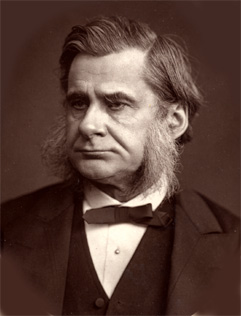Thomas Henry Huxley citáty a výroky
Thomas Henry Huxley: Citáty v angličtine
1860s, On a Piece of Chalk (1868)
Zdroj: 1860s, Evidence as to Man's Place in Nature (1863), Ch.2, p. 74
1890s
Sydney J. Harris, as quoted in The Routledge Dictionary of Quotations (1989) by Robert Andrews; also quoted as: "...a pleasant place in which to spend one's leisure."
Misattributed
Zdroj: 1860s, Evidence as to Man's Place in Nature (1863), Ch.1, p. 36
Zdroj: 1860s, Evidence as to Man's Place in Nature (1863), Ch.2, p. 127
“That mysterious independent variable of political calculation, Public Opinion.”
"Universities, Actual and Ideal" (1874) http://aleph0.clarku.edu/huxley/CE3/U-Ac-I.html
1870s
Zdroj: 1860s, Evidence as to Man's Place in Nature (1863), Ch.2, p. 86
Zdroj: 1860s, Evidence as to Man's Place in Nature (1863), Ch.2, p. 71
Zdroj: 1860s, Evidence as to Man's Place in Nature (1863), Ch.2, p. 101
"On the Educational Value of the Natural History Sciences" (1854) p. 29 http://books.google.com/books?id=FJZWAAAAcAAJ&pg=PA29
1850s
Zdroj: 1860s, Evidence as to Man's Place in Nature (1863), Ch.2, p. 126
Zdroj: 1860s, Evidence as to Man's Place in Nature (1863), Ch.2, p. 72
"Our Knowledge of the Causes of the Phenomena of Organic Nature" (1863) http://aleph0.clarku.edu/huxley/CE2/Phen.html
1860s
1860s, Reply to Charles Kingsley (1860)
“Logical consequences are the scarecrows of fools and the beacons of wise men.”
1870s, On the Hypothesis that Animals are Automata, and Its History (1874)
Zdroj: 1860s, Evidence as to Man's Place in Nature (1863), Ch.2, p. 119
Zdroj: 1860s, Evidence as to Man's Place in Nature (1863), Ch.2, p. 125
"On the Physical Basis of Life" (1868) http://aleph0.clarku.edu/huxley/CE1/PhysB.html
1860s
Zdroj: 1860s, Evidence as to Man's Place in Nature (1863), Ch.2, p. 95
1860s, On a Piece of Chalk (1868)
Advertisement to the Reader, p. 7
1860s, Evidence as to Man's Place in Nature (1863)
Another version of this quotation, omitting the "of me" phrase, appears in Life and Letters of Thomas Henry Huxley F.R.S (1900) edited by Leonard Huxley, p. 170
1880s, On the Reception of the Origin of Species (1887)
1860s, Criticisms on "The Origin of the Species" (1864)
Zdroj: 1860s, Evidence as to Man's Place in Nature (1863), Ch.2, p. 120
"Technical Education" (1877) http://aleph0.clarku.edu/huxley/CE3/TechEd.html
1870s
1870s, On the Hypothesis that Animals are Automata, and Its History (1874)
Letter to Charles Kingsley (6 May 1863)
1860s
"The Coming of Age of The Origin of Species" (1880) http://aleph0.clarku.edu/huxley/CE2/CaOS.html; Collected Essays, vol. 2
1880s
